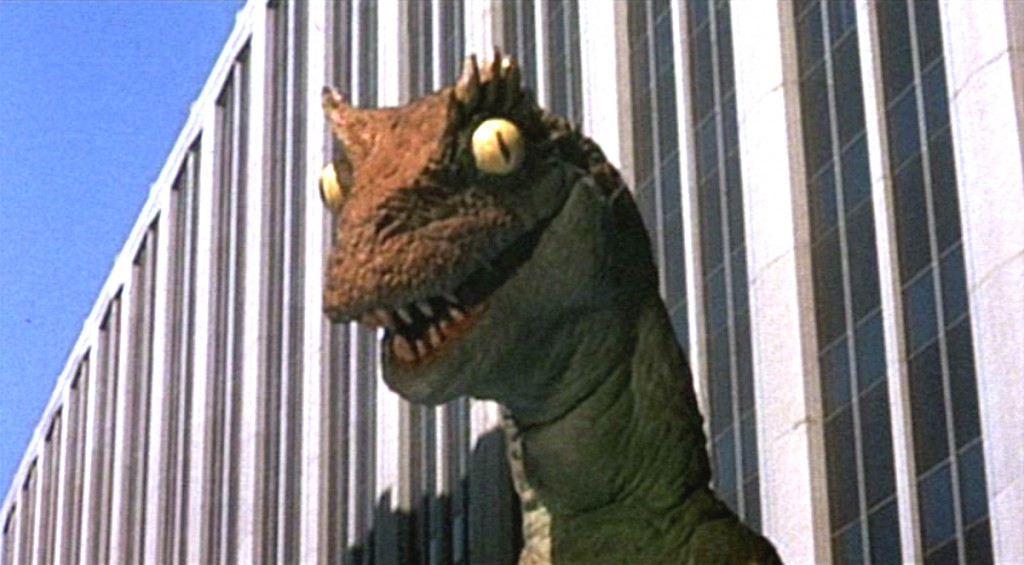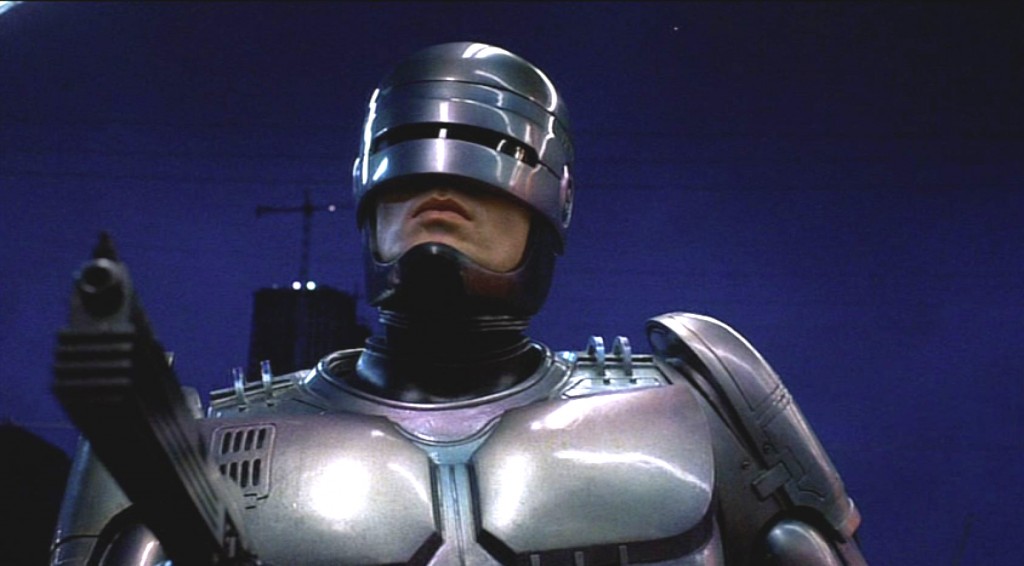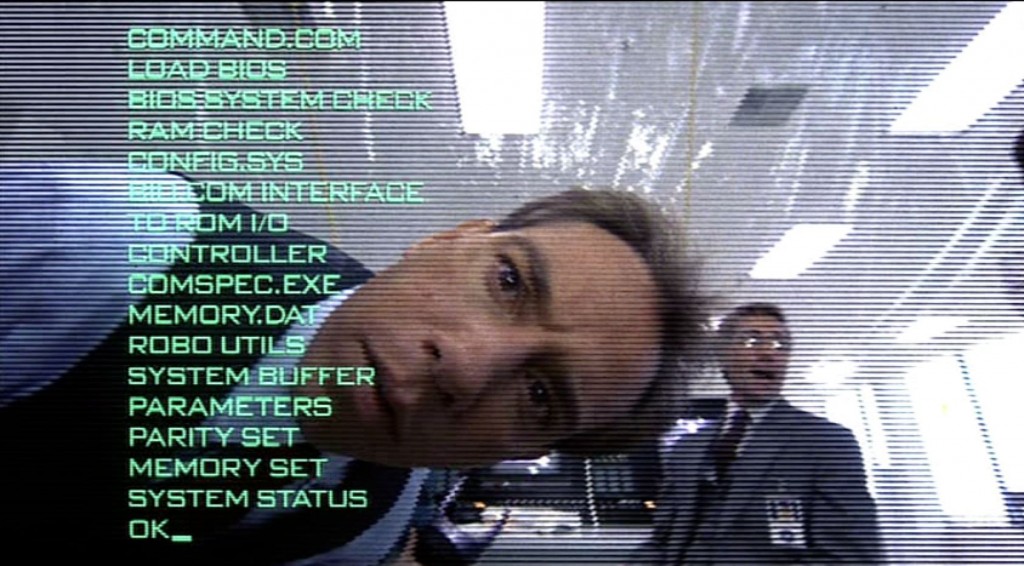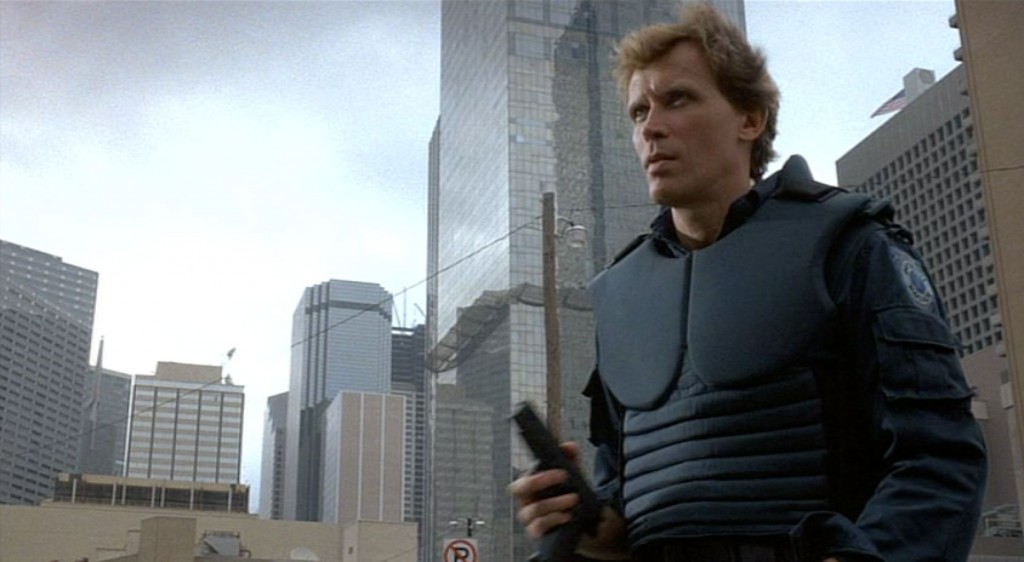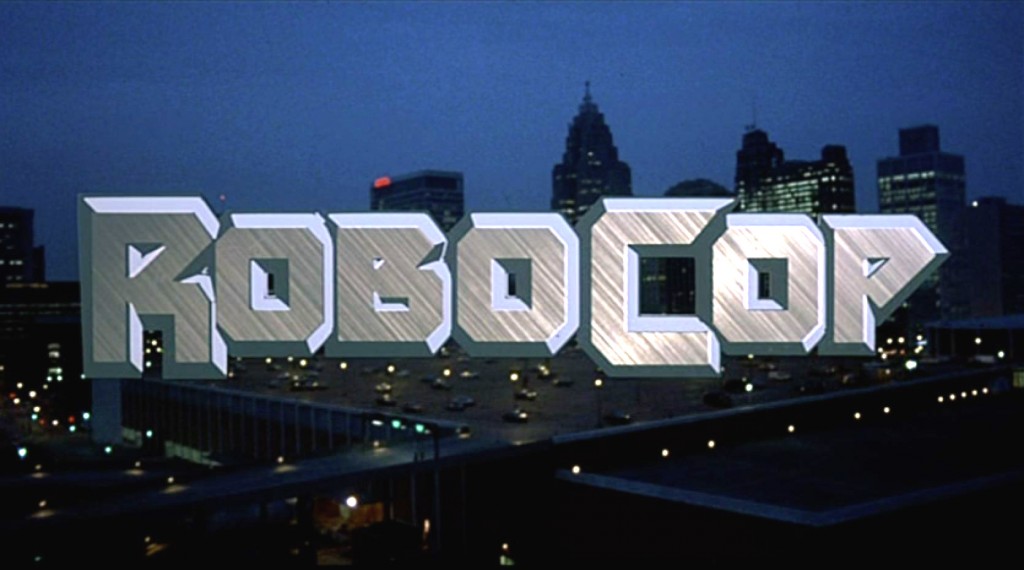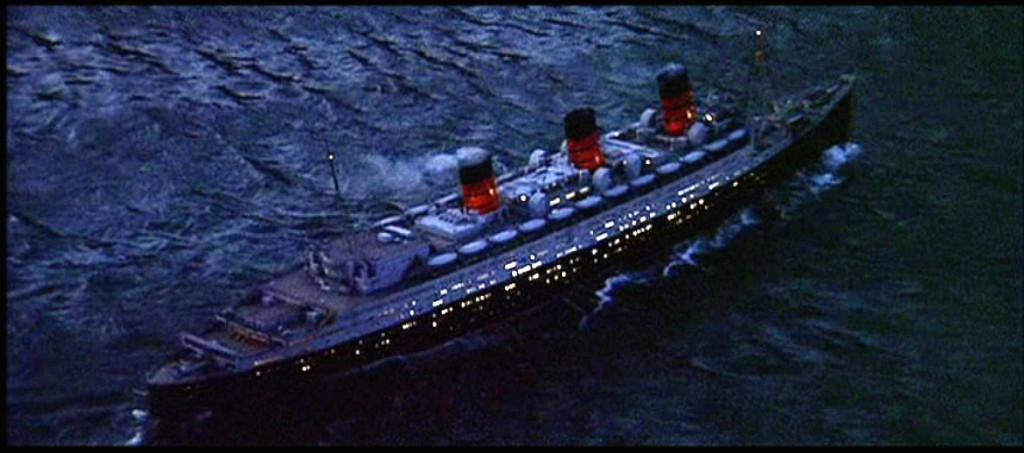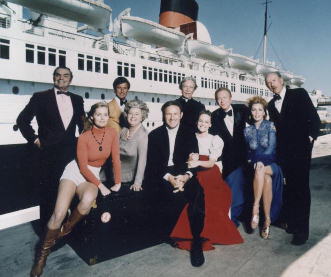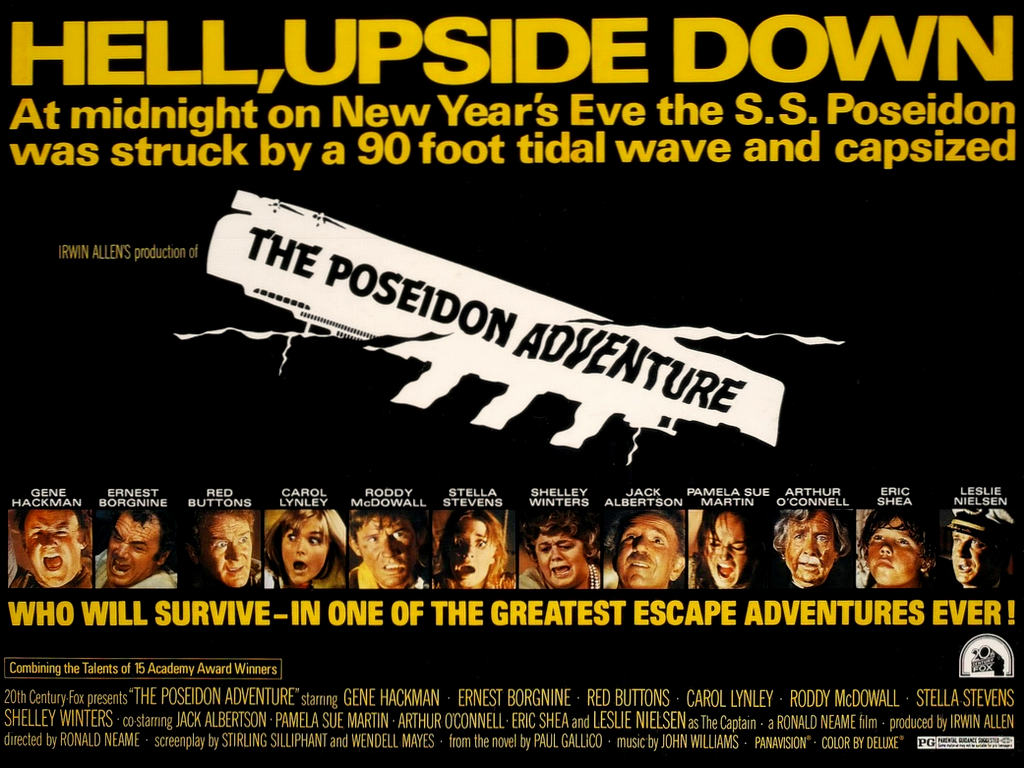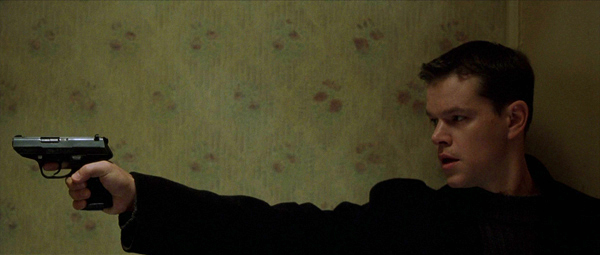Batman on the Big Screen
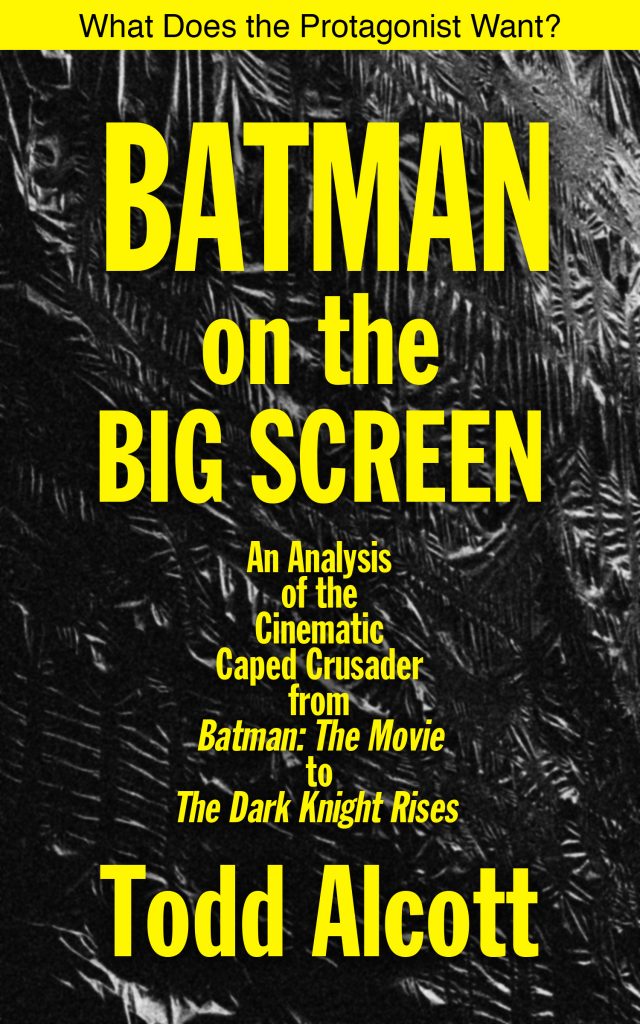
Batman on the Big Screen, a volume collecting everything I’ve written about the Caped Crusader, is now for sale at Amazon. It’s the first in what will be a long line of volumes under the What Does The Protagonist Want? banner. Having just finished editing it, I can tell you, it’s still highly addictive reading!
Favorite screenplays: Robocop part 5
It warms my analytic heart when filmmakers announce act breaks with devices, and Robocop does not disappoint. Each act begins with a news report and attendant commercials (as news is, lest we forget, just another form of entertainment in a corporate oligarchy). Act III begins with a commercial for a car, the 6000 SUX, done in the style of The Beast from 20,000 Fathoms, yet another low-budget film reference to let cinephiles know they’re dealing with a self-aware, intelligent satire. The dinosaur in the car commercial terrorizes the city streets until it’s dwarfed by the advertised car. The joke, of course, is not just that the car is huge, but that the huge car out-dinosaurs an actual dinosaur. (It’s also fueled by dead dinosaurs, if you want to take its dominance that far.)
Favorite screenplays: Robocop part 4
I did something of a disservice to Murphy when I said he gave up his protagonist status at the beginning of Act II of Robocop. What happens is something a little more subtle. Lots of superheroes undergo a transformation at the end of the first act of their origin stories, but few completely forget their previous identity. What happens to Murphy is that he falls into a kind of slumber, and in that slumber he dreams of being the kind of cop he’s always wanted to be: strong, resourceful, unfailingly just, and wicked cool. He wants to be TJ Lazer, essentially, he wants to be a TV cop, and Morton’s Robocop program gives him the chance to do that. The price he pays is his identity as Murphy, good husband and father. This is, the screenplay suggests, the bargain we all make when dealing with a corporate oligarchy: we gain a smidgen of that corporation’s power, but we give up our total identities as individuals in return. At the supply side, we become product, at the demand side we become consumers.
Favorite screenplays: Robocop part 3
Act I of Robocop begins with a television show, and contains references to other television shows. Act II also begins with a television show, except this time the viewer is the camera and the show is the real world. We are through the looking glass, as it were, in our view of this futuristic dystopia. Again, the exposition is delivered straight to the viewer and with plenty of wit and satire to lighten the load.
Favorite screenplays: Robocop part 2
Murphy is a simple man who has been drafted into a complex, dangerous world. When we catch up with him at the fourteen-minute mark, he’s practicing his gun-twirling. Why is he practicing his gun-twirling? Murphy explains to spitfire partner Lewis, because there is a cop on TV, T.J. Lazer, who is a “good cop,” and whom Murphy’s son loves. So in the space of twenty seconds or so, we learn that Murphy is a dedicated father, loves his son, wants “to be good” for the sake of that son. The bashfulness with which he describes this intimacy to Lewis indicates that he is also in love with his wife. This is without staging a “family scene” that would dramatize all this. Again, that’s probably due to budget, since the screenplay is telling instead of showing, but it has a dramatic payoff: the screenplay, like Murphy, at this point takes his happy family for granted. He’s good, his son is good, his wife is good, he sees people as good, he’s about to get a lesson in how bad people can be. Like Jason Bourne, Murphy will be forced to rediscover who he is, and for the most part the viewer will be put in the place of the protagonist, which is an ideal place for a viewer to be.
Favorite screenplays: Robocop part 1
The first and last question of any screenplay is “What does the protagonist want?” But sometimes it’s necessary to first define the world the protagonist lives in. This can be done a number of ways. In the low-budget movies of Roger Corman or William Castle, sometimes the movie begins with a simple monolgue straight to the audience. It’s cheap but effecient, and it forges a bond with the audience that “cooler” movies don’t. The filmmaker, in effect, makes a deal with the audience, saying: Look, I don’t have a big budget or fancy stars, all’s I got is ideas, work with me here.
Robocop isn’t quite that low-budget, but it does the next-step-up version of that: it opens with a TV news report. The smiling TV anchors tell us the days news: South Africa is going nuclear to preserve white control of the country, the president of the US stages a press conference from the orbiting space station with hilarious results, and police officers in Detroit, which has a privatized police force, are being slaughtered by a group of ruthless gangsters. The TV report, revving for maximum efficiency, goes so far as to name the movie’s chief antagonist, Clarence Boddicker, and its secret ultimate bad-guy, Dick Jones. Jones, the new leader of the new corporate-owned Detroit police force, expresses no sympathy for the policemen slaughtered on his watch. “If you can’t take the heat, stay out of the kitchen,” he advises any police officers who might object to being out-gunned by madmen. The TV news report also lays in a layer of knowing satire on the narrative, letting us know that it’s going to look at this world from a skeptical stance. It accomplishes the same thing as the Corman voice-over, it takes the audience aside and lets it know, quickly and cleanly, its attitude toward its genre and narrative.
(Speaking of low-budget exploitation movies, I assume Clarence Boddicker is named for Budd Boetticher, the great director of tight-lipped westerns.)
Favorite screenplays: The Poseidon Adventure part 3
It’s New Year’s Eve, approaching midnight, on this ship that is upside-down but nobody realizes it yet. We check in with all our main characters once again before disaster strikes. The working-class Rogos fight, then kiss and make up, the waif Nonnie sings, the lonely Mr. Martin (surrounded by young ladies) takes his vitamins, the Rosens kibitz, The Captain relaxes, Acres pours champaign, Rev Scott waxes hippy, Susan lusts for Rev Scott, and little Robin interrogates the Purser, who will soon become a pivotal character. The Purser, explaining himself to Robin, is the ship’s manager — not the owner (the businessman), not the captain (the leader) but the manager, the middle-man of song and story. Now that we’ve met everyone and examined their strategies for dealing with the chaos of a world upside-down, the world goes ahead and actually turns upside-down. Read more
Favorite screenplays: The Poseidon Adventure part 2
So, let’s remember, the metaphor in play in The Poseidon Adventure is “the world is upside-down.” The important thing to remember about this metaphor is that it’s already in play before the ship turns upside-down. That is, the world is already upside-down for the characters on the Poseidon, the tidal wave only serves to make the metaphor literal.
Favorite screenplays: The Poseidon Adventure part 1
The Poseidon Adventure was the first new, “grown up” movie I ever saw. I think the last movie I had seen previous to it was The Aristocats. People generally feel The Poseidon Adventure to be ham-fisted, stale and clunky, but in the winter of 1973 it was pretty mind-blowing, especially to an 11-year-old boy, and it changed the way I felt about movies forever. I would never be happy with Herbie Rides Again or The Apple Dumpling Gang after I had seen mass death and gripping adventure in the passageways of a capsized ocean liner. Read more
Favorite screenplays: The Bourne Identity part 8
Jason Bourne has killed his brother, The Professor, in self-defense. The Professor was sent to kill Jason at the behest of Conklin, who is both Jason’s and The Professor’s father. Conklin has pitted brother against brother to save face in the eyes of his own father Abbott. Abbott wants Jason dead and the whole Treadstone project to just kind of go away so that he can save face when reporting his budget to a Congressional committee. And so a political aspect of The Bourne Identity presents itself: an older, powerful white man feels discomfort about covering his ass, and that discomfort sends ripples down through the chain of power that results in young men, spiritual brothers, killing each other in a foreign land. The king’s discomfort results in the serf’s murder.
